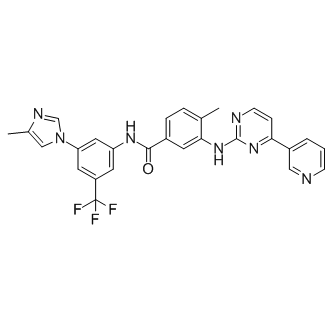| Description: |
Nilotinib is an orally available Bcr-Abl tyrosine kinase inhibitor with antineoplastic activity. |
| In Vivo: |
The percentage of tumor growth inhibition (TGI) is 83.8% for Imatinib and 69.6% for Nilotinib in the GK1X xenograft line (n.s.). In the GK2X xenograft line, TGI is 83.0% for Imatinib and 85.3% for Nilotinib (n.s.). Additionally, the GK3X xenograft line TGI is 31.1% for Imatinib and 47.5% for Nilotinib (n.s.). These results suggest that, except for the GK1X xenograft line, Nilotinib shows equivalent or higher antitumor effects than Imatinib[2]. Nilotinib has a significant healing effect on the macroscopic and microscopic pathologic scores and ensures considerable mucosal healing in the indomethacin-induced enterocolitis rat model. While Nilotinib decreased the PDGFR α and β levels and apoptotic scores in the colon, it did not have a significant effect on the weight and TNF-α levels. Further experimental investigations could provide more definitive evidence for humans[3]. |
| In Vitro: |
The novel, selective Abl inhibitor, Nilotinib (AMN107), is designed to interact with the ATP-binding site of BCR-ABL with a higher affinity than Imatinib. In addition to being significantly more potent compared with Imatinib (IC50<30 nM), Nilotinib also maintains activity against most of the BCR-ABL point mutants that confer Imatinib resistance[1]. Nilotinib demonstrates significant antitumor efficacy against GIST xenograft lines and Imatinib-resistant GIST cell lines. The parent cell lines GK1C and GK3C show Imatinib sensitivity with IC50 of 4.59±0.97 µM and 11.15±1.48 µM, respectively. The Imatinib-resistant cell lines GK1C-IR and GK3C-IR show Imatinib resistance with IC50 values of 11.74±0.17 µM (P<0.001) and 41.37±1.07 µM (P<0.001), respectively[2]. |






















